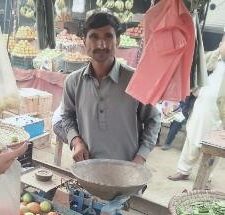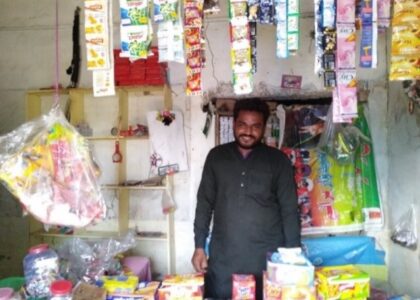
Objective: In response to the severe impact of the October 2023 flood on Village Jhuke Jander in Tehsil Paroa, District Dera Ismail Khan, IRC (International Rescue Committee) and HEADS (Health, Education, and Development Society) initiated a collaborative project. The primary objective was to address the acute water crisis inflicted upon the community by the flooding. The calamity had not only damaged infrastructure, including houses, but also left only a few hand pumps with compromised water quality. Recognizing the critical need for clean drinking water, the organizations prioritized Village Jhuke Jander for immediate intervention.
Village Demographics: Jhuke Jander village, nestled in the scenic landscape, is home to an estimated population of 11,830 individuals. Within this community, there are 1419 men, 1538 women, 4259 boys, and 4616 girls, collectively contributing to the vibrant social fabric of the village. The demographics reflect a diverse population, each playing a unique role in the village’s economic, social, and cultural dynamics. This detailed breakdown provides insights into the composition of Jhuke Jander, emphasizing the importance of understanding the varied demographics for targeted and inclusive development initiatives.
Economic Situation of the village Jhuke Jander: The fertile lands surrounding Jhuke Jander village provide an ideal environment for agricultural activities. The community engages in diverse farming practices, cultivating crops such as wheat, rice, sugarcane, and other seasonal produce. Besides crop cultivation, some community members are also involved in livestock farming, contributing to the overall agrarian economy of the area. Given the rural nature of the village, daily wage work is a significant source of income for many residents. Individuals may find employment in various labor-intensive tasks, such as construction, agricultural labor, and other community-based initiatives. Seasonal variations in agricultural activities often create opportunities for additional daily wage work during peak farming seasons. Some individuals in the community may secure employment in government sectors, taking up roles in education, health, administration. In addition to formal employment, community members may engage in entrepreneurial activities, establishing small businesses or participating in local trade.
Pre-Flood Situation: Prior to the flood, Jhuke Jander faced economic challenges primarily centered around agriculture, daily wage work, and limited access to clean drinking water. The flood exacerbated these issues, leading to economic hardship, displacement, and a heightened risk of waterborne diseases, especially among children.
Post-Flood Economic Conditions: Following the flood, life became more challenging for the community. To make matters worse, they had very little access to clean drinking water. The hand pumps, which were their main source of water, were damaged and no longer working due to the flood. This made it even harder for the people in the area.
Water Access Challenges: Before the intervention, the village struggled with inadequate access to clean drinking water, resulting in waterborne diseases, particularly affecting children. Lack of proper water sources further hindered the community’s ability to thrive.
Impact of Hand Pump Installation: The construction and installation of hand pumps by HEADS and IRC brought a significant positive transformation to village Jhuke Jander. The initiative aimed to provide a sustainable solution to the water crisis, ensuring clean and accessible water for the community.
Post-Intervention Transformation: After the completion of the hand pump installation project, the dream of clean drinking water became a reality for the residents of Jhuke Jander. The new hand pumps not only addressed the immediate water needs but also mitigated the risk of waterborne diseases, especially among children.
Implementation: After a meticulous assessment and extensive consultations with the local committee and community members, three potential sites were identified for the installation of hand pumps. IRC and HEADS, committed to providing sustainable solutions, successfully executed the installation of three hand pumps in the village, ensuring a reliable and clean water supply for the community.
Output: Number of Hand Pumps Installed: 3

Success Details: The impact of the project was palpable, as evidenced by the heartfelt gratitude expressed by Mr. Murreed Hussain, the Local Committee President. He commended IRC and HEADS for their facilitation in providing clean drinking water at the doorstep of the residents. The exceptional quality of work on the hand pumps was highlighted, noting that the community had not witnessed such high standards in the past. : Mr. Murreed shared, “We are grateful to IRC and HEADS for facilitating and providing us clean drinking water at our doorsteps. The quality of work on the hand pumps is worth appreciating; we have never witnessed such quality work in the past. Local residents are very happy and excited for the installation of hand pumps, and after a long time, they will get clean water at their doorsteps.”
Community Impact: The community, especially children, had been grappling with waterborne diseases due to unsafe water conditions. The installation of the hand pumps served as a transformative solution, addressing not only the immediate water crisis but also significantly improving public health outcomes. The project contributed to a substantial reduction in waterborne diseases, ensuring the well-being of the local residents, particularly the vulnerable children.
Community Resilience and Well-Being: The successful installation of hand pumps reflects the resilience of the community and the collaborative efforts of HEADS and IRC. The project not only provided a vital resource but also contributed to the overall well-being and health of the villagers.



